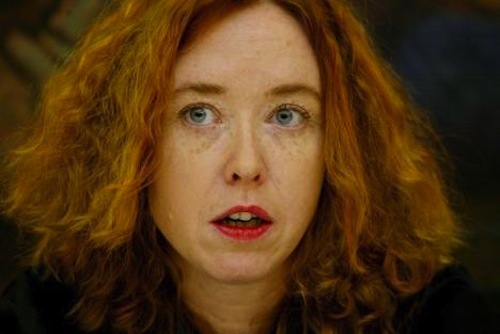Joyelle McSweeney on Aase Berg's Transfer Fat

We've been fans of Swedish poet and critic Aase Berg since her poems first began appearing in English--much of this can be credited to the translating work of Johannes Goransson, who brought us her first book, With Deer (Black Ocean), as well as a selection of her poems, Remainland (Action Books). And they've done it again! Transfer Fat, nominated in 2002 for Sweden’s prestigious Augustpriset for the best poetry book, has just been published by Ugly Duckling Presse and briefly reviewed by Joyelle McSweeney on Montevidayo. Throwing out a few titles, like “The Hare Infects Dad with Rabies” and “Mom Choice,” McSweeney goes on to write:
The titles act like membranes; they catch your attention; your attention becomes a little prod or probe. You push at the membrane of the title and move through it into the shell meat of the poem, carrying gummy traces of the title with you, covering your eyes, nose, mouth, changing your vision and your breathing. You’re now half-digesting, half-gestating the poem, which, by the sci-fi logic by which the book operates, means that you might now be destined to supernova in a slickly bloody birth.
Milk Hare
Feel fur in milk
The white fluff wads
scattered flinches through the forest
through the hare wolfThis is a four line poemlet in its entirety. The volume is made up of brief units like this, one or two to a page. This creates a delicious uncertainty to the whole. Like the individual protein strands which make up the helical DNA, the individual verse fits into the overall structure of volume both minutely and instrumentally; it could be the fuse which disrupts the transcription or a bit of fluff, fur in the milk, a white redundancy. Here the ‘fur in the milk’ cascades ‘flinches through the forest’ and breeds a mutant creature, ‘the hare wolf’, a mutation of both predator and prey in one which then recharacterizes the flinching forest (a single surface spasming with both fear and predatory instinct) and the harey-milk which inundates the poem, the page’s white space. The hare-wolf can no more be separated from the flinch forest than the poem from the page or the fur from the milk.
Another mechanism of Transfer Fat is its saturation with key words, including ‘hare’, ‘whale’, ‘milk’, ‘voter’, ‘Hal’ (the computer from 2001: A Space Odyssey), “shell”, and especially “fat”. As the series proceeds, these words cluster and agglomerate, diving into and rising from the syntax, giving the series an ectoplasmic-like continuity from which indentifiable shapes thrust up through but never entirely separated from the poem’s translucent mucky surface. Other poems pry one or two keywords from the word horde and fling them out into the chronosphere to carry its antigens of toxic mutation into new registers.
Read the full "Forest of Flinches" here. Kate Durbin writes of Goransson's translations that they "are themselves a kind of gorgeous, dripping fat transference, a 'carry[ing of the] smelt / across the hard lake,' an extra, extra 'pouring' of the 'runny body.'" You can find out more about the book here; and enjoy (if you haven't already) Goransson's specially edited issue of Typo, which featured a terrific survey of major Swedish-language Modernists and contemporary poets.


